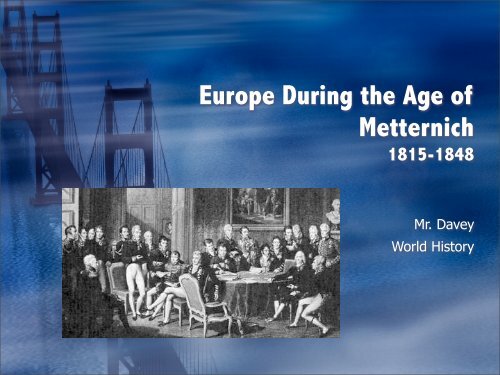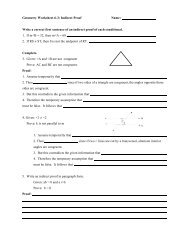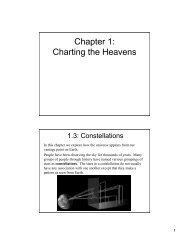Europe During the Age of Metternich 1815-1848 - Saratoga High ...
Europe During the Age of Metternich 1815-1848 - Saratoga High ...
Europe During the Age of Metternich 1815-1848 - Saratoga High ...
Create successful ePaper yourself
Turn your PDF publications into a flip-book with our unique Google optimized e-Paper software.
<strong>Europe</strong> <strong>During</strong> <strong>the</strong> <strong>Age</strong> <strong>of</strong><br />
<strong>Metternich</strong><br />
<strong>1815</strong>-<strong>1848</strong><br />
Mr. Davey<br />
World History
Precepts <strong>of</strong> Congress<br />
1. Legitimacy<br />
2. Balance <strong>of</strong> Power<br />
3. Treat France Fairly*<br />
4. Territorial Changes<br />
5. Concert <strong>of</strong> <strong>Europe</strong><br />
1. Keep status quo^<br />
<br />
<br />
<br />
<br />
<br />
<br />
<br />
<br />
Klemens von <strong>Metternich</strong><br />
<strong>Age</strong> <strong>of</strong> <strong>Metternich</strong><br />
France’s fate<br />
1 st Treaty <strong>of</strong> Paris<br />
May 1814<br />
1793 frontiers<br />
Lost Nice & Savoy<br />
No Indemnity<br />
No Occupation<br />
No loot returned<br />
Colonies to GB<br />
Napoleon to Elba<br />
<br />
<br />
<br />
<br />
<br />
<br />
<br />
<br />
2 nd Treaty <strong>of</strong> Paris<br />
November <strong>1815</strong><br />
1790 frontiers<br />
Lost Saarlouis etc.<br />
F700m+ indemnity<br />
Occupation 3-5 yrs<br />
Most Loot returned<br />
Colonies to GB<br />
Napoleon to St.<br />
Helena
Maintenance <strong>of</strong> Peace (Status Quo)<br />
Problems for <strong>the</strong> future<br />
Quadruple or Holy<br />
Intervene in internal affairs<br />
Or only in foreign affairs<br />
Problematic for British<br />
Pesky ISMs<br />
Quadruple<br />
Alliance, 20 Nov.<br />
<strong>1815</strong><br />
<br />
<br />
Britain, Russia,<br />
Austria, Prussia for<br />
20 years to contain<br />
France<br />
Later Quintuple<br />
Alliance or Concert<br />
<strong>of</strong> <strong>Europe</strong><br />
Holy Alliance, 26 Sept. <strong>1815</strong><br />
<br />
<br />
<br />
<br />
Frederick William III<br />
Talleyrand<br />
Tsar Alexander I’s idea<br />
‘a loud sounding<br />
nothing’ (Klemens von<br />
<strong>Metternich</strong>)<br />
‘a piece <strong>of</strong> sublime mysticism<br />
and nonsense’ (Castlereagh)<br />
‘members <strong>of</strong> one and <strong>the</strong> same<br />
Christian nation’ (Alexander I)<br />
Russia, Austria, Prussia
“If France sneezes, <strong>Europe</strong> catches a cold”<br />
France Under Louis XVIII<br />
Chamber <strong>of</strong> Deputies<br />
Chamber <strong>of</strong> Peers<br />
Liberals vs. Ultras<br />
Charles X takes <strong>the</strong> reign<br />
Views on ruling<br />
July Ordinances<br />
1.<br />
2.<br />
3.<br />
4.<br />
Results:
Reforms <strong>of</strong> Louis Philippe<br />
Revolution Spreads<br />
Belgium<br />
Different Types<br />
<strong>of</strong> Revolutions<br />
-Spain<br />
-Greece<br />
ISMS<br />
<strong>the</strong> Bourgeois Monarch
Ano<strong>the</strong>r Ism Effects <strong>Europe</strong>: Industrialism<br />
Spurs <strong>of</strong> Industrial Revolution<br />
England 1780s<br />
Why Did<br />
Industrialization<br />
Begin in<br />
England First
Ano<strong>the</strong>r Ism Effects <strong>Europe</strong>: Industrialism<br />
Spurs <strong>of</strong> Industrial Revolution<br />
England 1780s<br />
Why Did<br />
Industrialization<br />
Begin in<br />
England First<br />
That Nation <strong>of</strong> Shopkeepers!-- Napoleon
Anti-Corn Law League,<br />
1845<br />
Agricultural Revolution<br />
•Jethro Tull<br />
× Give manufactures more outlets for<br />
<strong>the</strong>ir products.<br />
× Expand employment.<br />
× Lower <strong>the</strong> price <strong>of</strong> bread.<br />
× Make British agriculture more<br />
efficient and productive.<br />
× Expose trade and agriculture to<br />
foreign competition.<br />
× Promote international peace through<br />
trade contact.<br />
Agricultural Revolution<br />
1. New Techniques<br />
2. New Necessities<br />
3. Enclosure Movement
Metals, Woolens, &<br />
Canals<br />
Britain’s Earliest<br />
Transportation<br />
Infrastructure
Results <strong>of</strong> Industrialization<br />
• Reallocation <strong>of</strong> labor<br />
1813 2400 looms 150, 000 workers<br />
1833 85, 000 looms 200, 000 workers<br />
1850 224, 000 looms >1 million workers<br />
Textile Factory Workers in England<br />
• Decrease in power <strong>of</strong> aristocracy
Development <strong>of</strong> <strong>the</strong> Industrial Revolution
Development <strong>of</strong> <strong>the</strong> Industrial Revolution
Adam Smith & David Ricardo<br />
•Beginnings <strong>of</strong> Economics<br />
–New Thoughts and Ideas
Adam Smith & David Ricardo<br />
•Beginnings <strong>of</strong> Economics<br />
–New Thoughts and Ideas<br />
× Invisible Hand
Adam Smith & David Ricardo<br />
•Beginnings <strong>of</strong> Economics<br />
–New Thoughts and Ideas<br />
× Invisible Hand<br />
× “Laissez-faire”
Adam Smith & David Ricardo<br />
•Beginnings <strong>of</strong> Economics<br />
–New Thoughts and Ideas<br />
× Invisible Hand<br />
× “Laissez-faire”<br />
× “Iron Law <strong>of</strong> Wages.”
Adam Smith & David Ricardo<br />
•Beginnings <strong>of</strong> Economics<br />
–New Thoughts and Ideas<br />
× Invisible Hand<br />
× “Laissez-faire”<br />
× “Iron Law <strong>of</strong> Wages.”<br />
× When wages are high,<br />
workers have more<br />
children.
Adam Smith & David Ricardo<br />
•Beginnings <strong>of</strong> Economics<br />
–New Thoughts and Ideas<br />
× Invisible Hand<br />
× “Laissez-faire”<br />
× “Iron Law <strong>of</strong> Wages.”<br />
× When wages are high,<br />
workers have more<br />
children.<br />
× More children create a<br />
large labor surplus that<br />
depresses wages.
The Socialists:<br />
Karl Marx<br />
Utopians & Marxists<br />
proletariat<br />
} People as a society would operate and own <strong>the</strong><br />
means <strong>of</strong> production, not individuals.<br />
} Their goal was a society that benefited<br />
everyone, not just a rich, well-connected few.<br />
} Tried to build perfect communities [utopias].
The Factory System<br />
× Rigid schedule.<br />
× 12-14 hour day.<br />
× Dangerous<br />
conditions.<br />
× Mind-numbing<br />
monotony.<br />
The "Haves":<br />
Bourgeois Life<br />
Thrived on <strong>the</strong> Luxuries<br />
<strong>of</strong> <strong>the</strong><br />
Industrial Revolution
The Utilitarians:<br />
Jeremy Bentham & John Stuart Mill<br />
× The goal <strong>of</strong> society is <strong>the</strong> greatest good<br />
for <strong>the</strong> greatest number.<br />
× There is a role to play for government<br />
intervention to provide some social safety<br />
net.
Private Charities: Soup Kitchens<br />
The New Urban<br />
Poor
Comparative Weight <strong>of</strong><br />
Factory & Non-Factory<br />
Children [in lbs.]<br />
Ag<br />
e<br />
Average<br />
weight <strong>of</strong><br />
males in<br />
factories<br />
Average<br />
weight <strong>of</strong><br />
males not<br />
in<br />
factories<br />
Ag<br />
e<br />
Average<br />
weight <strong>of</strong><br />
females in<br />
factories<br />
Average<br />
weight <strong>of</strong><br />
females<br />
not in<br />
factories<br />
9 51.76 53.26 9 51.13 52.40<br />
10 57.00 60.28 10 54.80 54.44<br />
11 61.84 58.36 11 59.69 61.13<br />
12 65.97 67.25 12 66.08 66.07<br />
13 72.11 75.36 13 73.25 72.72<br />
14 77.09 78.68 14 83.41 83.43<br />
15 88.35 88.83 15 87.86 93.61
Thomas Malthus<br />
× Population growth will<br />
outpace <strong>the</strong> food supply.<br />
× War, disease, or famine<br />
could control population.<br />
× The poor should have<br />
less children.<br />
× Food supply will <strong>the</strong>n<br />
keep up with population.
The Chartists<br />
Key<br />
Chartist<br />
settlements<br />
Centres <strong>of</strong><br />
Chartism<br />
Area <strong>of</strong> plug<br />
riots, 1842
The “Peoples’ Charter”<br />
× Drafted in 1838 by William Lovett.<br />
× Radical campaign for Parliamentary<br />
reform <strong>of</strong> <strong>the</strong> inequalities created by <strong>the</strong><br />
Reform Bill <strong>of</strong> 1832.<br />
1. Votes for all men.<br />
2. Equal electoral districts.<br />
3. Abolition <strong>of</strong> <strong>the</strong> requirement that<br />
Members <strong>of</strong> Parliament be property<br />
owners.<br />
4. Payment for Members <strong>of</strong> Parliament.<br />
5. Annual general elections.<br />
6. The secret ballot.
Government Response<br />
× Abolition <strong>of</strong> slavery in <strong>the</strong> colonies<br />
in 1832 [to raise wages in Britain].<br />
× Sadler Commission to look into working conditions<br />
* Factory Act [1833] – child labor.<br />
× New Poor Law [1834] – indoor relief.<br />
* Poor houses.<br />
× Reform Bill [1832] – broadens <strong>the</strong> vote for <strong>the</strong> cities.<br />
×Second Reform Bill: 1872 Secret Ballot<br />
×Third Reform Bill: 1884 all males over 25<br />
× 1870 Education Act<br />
× Workman's Compensation Act, 1897<br />
× Old <strong>Age</strong> Pensions, unemployment relief
Total British National Income
Industrialization on <strong>the</strong> Continent
Revolutions <strong>of</strong> <strong>1848</strong><br />
Causes <strong>of</strong> <strong>the</strong> <strong>1848</strong> Revolution<br />
Events in France:<br />
Bad Harvests 1846-<strong>1848</strong><br />
Gap between Rich and poor<br />
Working conditions (13-15 hr days)<br />
Louis Blanc ("The right to work")<br />
Pierre-Joseph Proudhon ("Property is<br />
<strong>the</strong>ft!", "God is evil") (anarchism)<br />
<strong>1848</strong>: Communist Manifesto Karl Marx<br />
Political Ga<strong>the</strong>rings outlawed<br />
Banquets<br />
Barricades<br />
Mr. Smith - Feb. 24, <strong>1848</strong><br />
Results in France:<br />
2nd Republic: Universal suffrage and<br />
Unemployment relief but wealthy leave (54%<br />
decline in businesses)<br />
Revolutions Spread: Germany, Austria…
Results in France<br />
Louis Napoleon<br />
2nd French Republic<br />
National Workshops, which guaranteed<br />
French citizens' "right to work"<br />
Not Popular with Peasants or Businessmen<br />
June Days: Workers rise again…when<br />
workshops closed by govt.(Marx sees<br />
hope)<br />
Liberals response, Army butchers<br />
2nd French Empire (Dec. ‘52)<br />
Authoritarian-->Liberal Progressive<br />
Legacy <strong>of</strong> <strong>1848</strong><br />
. . . “We have been beaten and humiliated . . . scattered, imprisoned,<br />
disarmed and gagged. The fate <strong>of</strong> <strong>Europe</strong>an democracy has slipped from<br />
our hands.”<br />
25
















